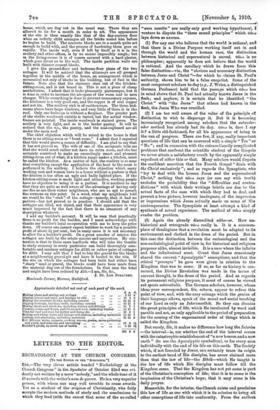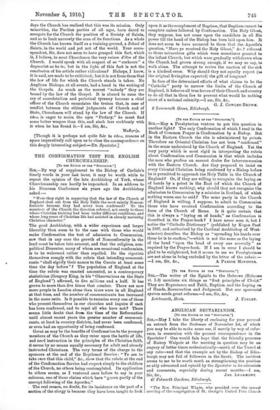LETTERS TO THE EDITOR.
ESCHATOLOGY AT THE CHURCH CONGRESS. [to ?RE EDITOR OF THE " SPECTATOR:] SIR,—The very clever article headed "Eschatology at the Church Congress" in the Spectator of October 22nd was evi- dently not written by a mere "nobody," and the whole tone of it ill accords with the writer's nom de guerre. He is a very superior perbon, with whom one may well tremble to cross swords. Yet as a student of the origines of Christianity, who fully accepts the modern methods of study and the conclusions to which they lead (with the caveat that some of the so-called
" sure results " are really only good working hypotheses), I venture to dispute the " three sound principles " which arts lays down as amount.
(1) For any one who believes that the world is rational, and that there is a Divine Purpose working itself out in and through the world and the human race, the distinction between historical and supernatural is unreal. Wily is no philosopher; apparently he does not believe that the world is rational. And the corollary which be draws from this false distinction—viz., the "obvious and necessary distinction between Jesus and Christ "—for which he claims St. Paul's authority, shows him to be a false exegetist. Some of the most competent scholars to-day (e.g., J. Weiss, a distinguished German Professor) hold that the passage which (2■31-cs has in mind shows that St. Paul had actually known Jesus in the flesh; and anyhow, it is certain that he identified "the Christ" with "the Jesus" that others had known in the flesh, the Jesus Who was crucified.
(2) I am too well aware of the value of the principle of distinction to wish to disparage it. But it is becoming increasingly recognised among scholars that the entweder- oder method has already had its day. tpirr,g is, dare I say it P a little old-fashioned, for all his appearance of being in the van of progress. There are few, if any, really important questions of life that can be answered with a simple " Yes " or " No "; and in connexion with the extraordinarily complicated problems that confront the scientific student of the Gospels we never attain a satisfactory result by the apparently simple expedient of either this or that. Many scholars would dispute the confident assertion that the Fourth Gospel "deals with the Christ exclusively "; and as regards the Synoptists, who "try to deal with the human Jesus and the supernatural Christ," nothing that olern. says (or can say with truth) excludes the probability that the "difficulties and contra- dictions" with which their writings bristle are due to the actual facts of the case with which they had to deal, and present a true picture, however inadequate, of the impression or impressions which Jesus actually made on some of His contemporaries. The Synoptists at least attempt a kind of synthesis of actual experience. The method of oilTit simply evades the problem.
(3) Again the already discredited either-or. How un- historical and retrograde ()his really is. It is a common- place of theologians that a revelation must be adapted to its environment and clothed in the dress of the period. But in this ease the distinction between the eschatological and the non-eschatological point of view is, for historical and religious purposes alike, almost invisible. It is a case where the infinite and the infinitesimal meet. Grant that Jesus consciously shared the current " Apocalyptic " conceptions, and that the ethical " precepts " he gave were given in relation to the Kingdom that was to come. If so, as far as history is con- cerned, the Divine Revelation was made in the terms of current thought, in the dress of the period. And as regards its permanent religious purpose, it must of course be viewed sub specie aeternitatis. The German scholars, however, whose ideas your correspondent, Sir, echoes, appear to refuse this point of view, and, with the easy coinage which the genius of their language allows, speak of the moral and social teaching of our Lord as only an Interintsethik. So they can dismiss the great principles of life, which He inculcated by word and parable and act, as only applicable to the period of preparation for the coming of the supernatural order of things which is called the Kingdom.
But surely, Sir, it makes no difference how long the Interim —the interval—is, nor whether the end of the interval comes with the catastrophic establishment of "a new heaven and a new earth" (to use the Apocalyptic symbolism), or for every man individually with the end of his life on this earth. The Society which, if not founded by Jesus, can certainly trace its origin to the earliest band of His disciples, has never claimed more than that the law of life—the Ethik—which He taught is the law of life which His disciples must follow till the Kingdom come. That the Kingdom has not yet come is part of the Christian's conception of life; that it is to come is the inspiration of the Christian's hope; that it may come is his daily prayer.
Meanwhile, for the interim, the Church exists and proclaims this law of life as one with which it is its mission to bring all other conceptions of life into conformity. From the earliest
days the Church has realised that this was its mission. Only minorities, the Puritan parties of all ages, have dared to arrogate for the Church the position of a Society of Saints, and so to limit narrowly the area of its functions. As a whole the Church has known itself as a training-ground, a School of Saints, in the world and yet not of the world. Your corre- spondent, Sir, does not seem to have grasped this fact, which I believe, to most Churchmen the very raison d'itre of the Church. I would speak with all respect of so " cocksure " a dogmatist as he is; but in the light of this fact is not the conclusion of his article rather ridiculous? Bishops, I know, it is said, are made to be criticised; but it is not from them that the law of life for which the Church stands is taken. No Anglican Bishops, at all events, had a hand in the writing of the Gospels. As much as the merest "nobody" they are bound by the law of the G-ospel. It is absurd to raise the cry of sacerdotalism and prelatical tyranny because a chief officer of the Church enunciates the truism that, in case of conflict between the ethical judgments of Church and of State, Churchmen will stand by the law of the Church. If otra is eager to maim the ogre "Prelacy," he must find some better weapon than this, and slash less recklessly with it when he has found it.—I am, Sir, &o.,
Maenrris.
[Though it is perhaps not quite fair to Wilt, reasons of space imperatively call upon us to close the correspondence on this deeply interesting subject.—En. Spectator.]



































































 Previous page
Previous page